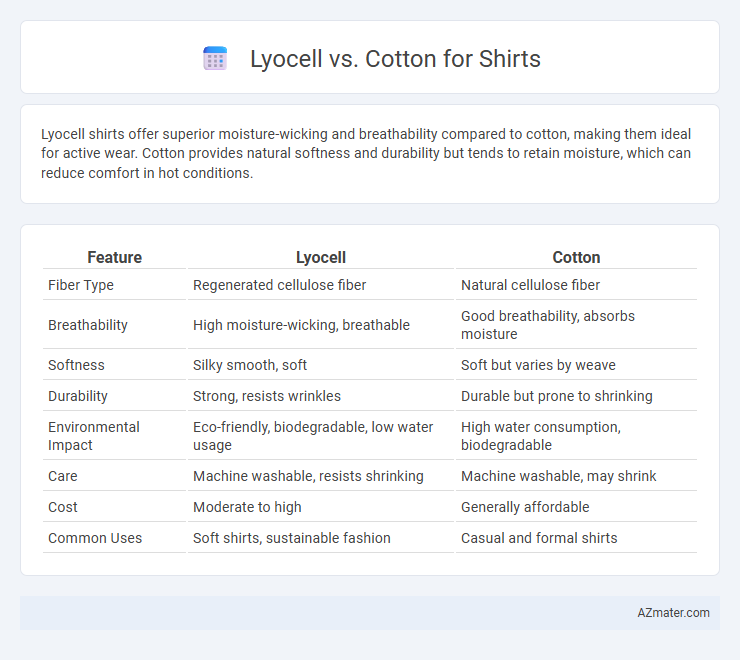Lyocell shirts offer superior moisture-wicking and breathability compared to cotton, making them ideal for active wear. Cotton provides natural softness and durability but tends to retain moisture, which can reduce comfort in hot conditions.
Table of Comparison
| Feature | Lyocell | Cotton |
|---|---|---|
| Fiber Type | Regenerated cellulose fiber | Natural cellulose fiber |
| Breathability | High moisture-wicking, breathable | Good breathability, absorbs moisture |
| Softness | Silky smooth, soft | Soft but varies by weave |
| Durability | Strong, resists wrinkles | Durable but prone to shrinking |
| Environmental Impact | Eco-friendly, biodegradable, low water usage | High water consumption, biodegradable |
| Care | Machine washable, resists shrinking | Machine washable, may shrink |
| Cost | Moderate to high | Generally affordable |
| Common Uses | Soft shirts, sustainable fashion | Casual and formal shirts |
Introduction to Lyocell and Cotton
Lyocell is a sustainable fiber made from wood pulp, known for its softness, breathability, and moisture-wicking properties, making it an ideal fabric for shirts. Cotton, a natural fiber harvested from cotton plants, is widely favored for its durability, comfort, and ability to regulate temperature. Both fabrics offer distinct benefits, with Lyocell excelling in eco-friendliness and smooth texture, while cotton provides traditional comfort and easy care.
Fabric Origins: Lyocell vs Cotton
Lyocell is a sustainable fabric made from wood pulp, primarily derived from fast-growing eucalyptus trees using a closed-loop process that recycles water and solvents, minimizing environmental impact. Cotton is a natural fiber harvested from cotton plants, known for its breathability and softness but often associated with high water usage and pesticide application in conventional farming. Choosing between Lyocell and cotton involves considering renewable resource sources, production sustainability, and environmental footprint.
Environmental Impact Comparison
Lyocell, produced from sustainably sourced eucalyptus wood using a closed-loop process, significantly reduces water consumption and chemical waste compared to conventional cotton cultivation, which is notorious for high water usage and pesticide application. Cotton farming requires approximately 20,000 liters of water per kilogram of fiber and contributes to soil degradation, while Lyocell's eco-friendly production minimizes environmental footprint through efficient resource use and biodegradability. As a result, Lyocell shirts offer a more sustainable and less pollutive alternative to traditional cotton shirts, aligning with growing eco-conscious consumer demand.
Softness and Comfort Differences
Lyocell shirts offer superior softness due to their smooth, fine fibers that retain moisture and reduce skin irritation, enhancing overall comfort. Cotton shirts provide breathability and natural softness but can feel coarser and less moisture-wicking compared to lyocell. The moisture management of lyocell ensures a cooler, drier feel in warm conditions, making it ideal for sensitive skin or active wear.
Breathability and Moisture Management
Lyocell offers superior breathability compared to cotton due to its unique fiber structure, which facilitates better air circulation and quicker moisture evaporation. This fabric excels in moisture management by efficiently wicking sweat away from the skin, keeping the wearer dry and comfortable during extended wear. Cotton, while breathable, tends to retain moisture longer, making Lyocell a preferred choice for performance and comfort in shirts.
Durability and Longevity
Lyocell fabric demonstrates superior durability compared to cotton, offering enhanced tensile strength and resistance to wear, making shirts last longer through frequent use and washing. Cotton, while breathable and soft, tends to degrade faster with repeated laundering, leading to pilling and fiber weakening over time. The moisture-wicking and wrinkle-resistant properties of lyocell contribute to its prolonged longevity, maintaining a fresh look in shirts far beyond standard cotton garments.
Care and Maintenance Requirements
Lyocell shirts require gentle washing in cold water and air drying to maintain fiber integrity and prevent shrinking, while cotton shirts can withstand warmer water temperatures and machine drying but may shrink more easily. Both fabrics benefit from avoiding bleach and ironing on low to medium heat, with Lyocell demanding more delicate handling to preserve its smooth texture. Proper care extends the lifespan of Lyocell, maintaining its softness and moisture-wicking properties, whereas cotton's durability allows for more robust cleaning without significant damage.
Costs and Price Points
Lyocell shirts typically have higher price points than cotton due to the advanced manufacturing process and sustainable sourcing of cellulose fibers. Cotton remains more cost-effective, benefiting from widespread availability and established production infrastructure, which lowers retail prices. Consumers seeking eco-friendly options may accept the premium cost of lyocell for its softness and moisture-wicking properties despite the higher investment.
Style and Appearance
Lyocell shirts offer a smooth, lustrous finish that enhances color vibrancy and provides a modern, polished look compared to cotton. Cotton fabric typically has a matte appearance with a more casual and textured aesthetic, which can vary based on the weave and quality. The sleek drape of Lyocell contributes to a refined silhouette, making it ideal for stylish, contemporary shirts.
Which Shirt Fabrics Suit Your Needs?
Lyocell shirts offer superior moisture-wicking and breathability compared to cotton, making them ideal for active wear and hot climates. Cotton shirts provide natural softness and durability, suited for everyday casual and formal occasions. Choosing between Lyocell and cotton depends on your priorities for comfort, environment, and performance in shirt fabrics.

Infographic: Lyocell vs Cotton for Shirt
 azmater.com
azmater.com